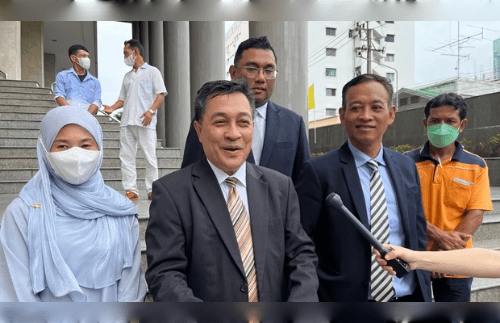By Gao Feng for RFA Mandarin

court in the southern Chinese city of Guangzhou on Thursday jailed veteran dissident Wang Aizhong for three years after he retweeted foreign media reports on Chinese social media platforms.
The Tianhe District People’s Court handed down the jail term after finding Wang guilty of “picking quarrels and stirring up troubles,” a charge frequently used to target peaceful critics of the ruling Chinese Communist Party.
The court found that Wang had “used social media platforms to quote and repost false reports in the foreign media about China’s political system.”
Wang, 46, also stood accused of “adding false information that seriously damaged China’s image” and of causing “serious public disorder,” it said.
Police threw a security cordon around the court building, with plainclothes and uniformed officers patrolling nearby streets, and took Wang’s wife Wang Henan to attend the trial, escorted by state security police, she told Radio Free Asia.
“One man and two women from the state security police sent a special car to meet me downstairs from our apartment and take me to the court,” Wang Henan said. “The two women watched me the whole time.”
She described the sentence handed to her husband as “a joke.”
“It’s an absolute joke, and we totally refuse to accept it,” she said. “His lawyers have argued all along that Aizhong is innocent, because nothing that he said added up to a crime.”
‘A way of keeping me quiet’
Wang Henan said she was prevented from attending the pretrial conference with her husband and his defense team, despite not having seen him in two years.
“They don’t want me to know too much about the process and content of the trial,” she said. “It’s a way of keeping me quiet and stopping me from posting something publicly.”
“They also want to torture me psychologically because I love Aizhong, and I haven’t seen him for two years,” Wang Henan said.
Outside the courtroom, police were stationed on nearby sidewalks in a bid to prevent Wang’s supporters from showing up for him.
“There are plainclothes police officers dotted along more than one kilometer from the court gates, all the way to the subway entrance,” a Guangzhou resident who requested anonymity for fear of reprisals told Radio Free Asia.
“I’m guessing there are about 70-80 of them in total, and seven or eight of them are currently surrounding me,” he said. “One of them asked to see my ID … then I was told to leave immediately or I would be taken to the police station.”
Fellow rights activist Liang Yiming said Wang’s online comments had always been very moderate, and that had only been exercising his constitutional right to freedom of speech.
“Take the pandemic in Wuhan,” Liang said. “Wang Aizhong once called on them to disclose the number of deaths, but the authorities felt that this would cause panic.”
“They don’t like people to be so proactive, but we as citizens have the right to question them, or why would we pay our taxes and fund a government that just does whatever it wants,” he said.
Guangzhou protests
The length of Wang’s sentence likely means he will be released in May 2024, after time already served is deducted from the sentence. The family has indicated that it supports him in appealing the sentence.
Wang was initially detained at his home in Guangdong’s provincial capital, Guangzhou in May 2021, and his apartment searched by police, who confiscated reading materials and computer devices.
He had been a key activist during protests in Guangzhou in January 2013 that were sparked by the rewriting of a New Year’s Day Southern Media Group editorial calling for constitutional government.
Activists, journalists, and academics faced off with the authorities for several days after the Southern Weekend newspaper was forced to change a New Year editorial calling for political reform into a tribute praising the Chinese Communist Party.
The protest was one of the first overt calls by members of the public for political freedom since large-scale pro-democracy demonstrations were crushed in a military crackdown in Beijing’s Tiananmen Square in 1989.
He was later detained in 2014 on suspicion of the same charge, shortly before the 25th anniversary of the June 4, 1989, Tiananmen massacre.
Translated by Luisetta Mudie. Edited by Malcolm Foster.
Copyright © 1998-2020, RFA. Used with the permission of Radio Free Asia, 2025 M St. NW, Suite 300, Washington DC 20036. https://www.rfa.org.














